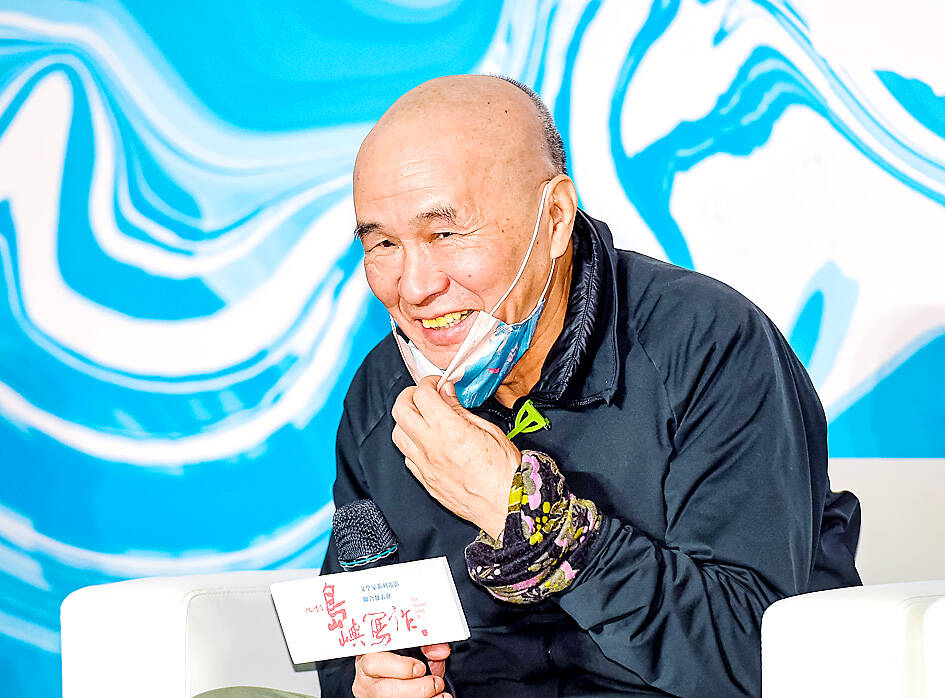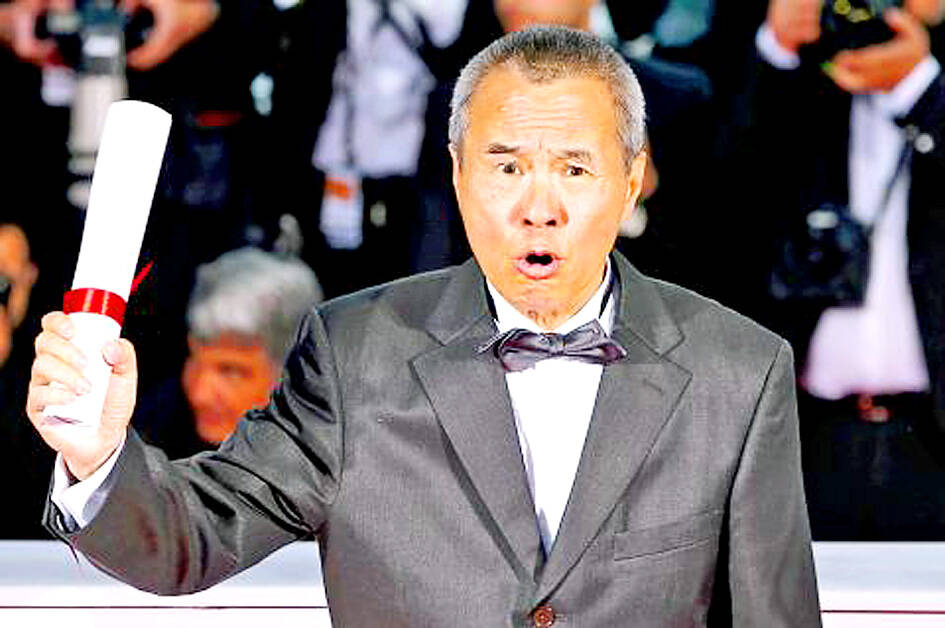Film director Hou Hsiao-hsien (侯孝賢) is to retire from cinema due to Alzheimer’s disease, his family said in a brief statement yesterday.
The announcement came on the heels of an IndieWire report that said Hou had retired due to dementia, citing among its sources a remark by an associate and film expert Tony Rayns in an introduction during the screening of Hou’s 1985 film A Time to Live and a Time to Die (童年往事).
Hou’s office in Taipei has closed its doors and its employees dismissed, the film industry and review Web site said.

Photo: Wang Wen-lin, Taipei Times
Hou’s son yesterday said in a statement that his father had been diagnosed with Alzheimer’s disease and that he had been making the long-awaited Shulan River (舒蘭河上) despite his condition until a COVID-19 infection forced an end to the project.
The family expressed hope that Hou’s friends and fans would not be saddened by his retirement, and that Hou “found his love for movies to have become more purified” before catching COVID-19.
“Hou has returned fully to family life following his recovery [from COVID-19] and he is in good mental and physical condition,” his son said, urging the public to give Hou space to enjoy his life with loved ones.

Photo: Reuters
Although Hou would not complete Shulan River, his works have already garnered acclaim from critics around the world, including many film classics that “assuredly will withstand the tides of time and be remembered,” his son said.
“Hou’s passion and approach to filmmaking will continue to live in his comrades and fans,” he said. “We give our most sincere thanks.”
Hou’s company is to continue operations, his son said.

Photo courtesy of Activator Co. Ltd.
Hou rose to international fame after his 1989 film City of Sadness (悲情城市) won the Golden Lion award at the Venice Film Festival.
The director’s later works, including The Puppetmaster (戲夢人生), Flowers of Shanghai (海上花) and Three Times (最好的時光) won plaudits at global movie festivals and independent film events.
Hou released his last film, The Assassin (刺客聶隱娘), in 2015, for which he received the Best Director award at that year’s Cannes Film Festival.

The US government has signed defense cooperation agreements with Japan and the Philippines to boost the deterrence capabilities of countries in the first island chain, a report by the National Security Bureau (NSB) showed. The main countries on the first island chain include the two nations and Taiwan. The bureau is to present the report at a meeting of the legislature’s Foreign Affairs and National Defense Committee tomorrow. The US military has deployed Typhon missile systems to Japan’s Yamaguchi Prefecture and Zambales province in the Philippines during their joint military exercises. It has also installed NMESIS anti-ship systems in Japan’s Okinawa

‘WIN-WIN’: The Philippines, and central and eastern European countries are important potential drone cooperation partners, Minister of Foreign Affairs Lin Chia-lung said Minister of Foreign Affairs Lin Chia-lung (林佳龍) in an interview published yesterday confirmed that there are joint ventures between Taiwan and Poland in the drone industry. Lin made the remark in an exclusive interview with the Chinese-language Liberty Times (the Taipei Times’ sister paper). The government-backed Taiwan Excellence Drone International Business Opportunities Alliance and the Polish Chamber of Unmanned Systems on Wednesday last week signed a memorandum of understanding in Poland to develop a “non-China” supply chain for drones and work together on key technologies. Asked if Taiwan prioritized Poland among central and eastern European countries in drone collaboration, Lin

BACK TO WORK? Prosecutors said they are considering filing an appeal, while the Hsinchu City Government said it has applied for Ann Kao’s reinstatement as mayor The High Court yesterday found suspended Hsinchu mayor Ann Kao (高虹安) not guilty of embezzling assistant fees, reducing her sentence to six months in prison commutable to a fine from seven years and four months. The verdict acquitted Kao of the corruption charge, but found her guilty of causing a public official to commit document forgery. The High Prosecutors’ Office said it is reviewing the ruling and considering whether to file an appeal. The Taipei District Court in July last year sentenced Kao to seven years and four months in prison, along with a four-year deprivation of civil rights, for contravening the Anti-Corruption

NO CONFIDENCE MOTION? The premier said that being toppled by the legislature for defending the Constitution would be a democratic badge of honor for him Premier Cho Jung-tai (卓榮泰) yesterday announced that the Cabinet would not countersign the amendments to the local revenue-sharing law passed by the Legislative Yuan last month. Cho said the decision not to countersign the amendments to the Act Governing the Allocation of Government Revenues and Expenditures (財政收支劃分法) was made in accordance with the Constitution. “The decision aims to safeguard our Constitution,” he said. The Constitution stipulates the president shall, in accordance with law, promulgate laws and issue mandates with the countersignature of the head of the Executive Yuan, or with the countersignatures of both the head of the Executive Yuan and ministers or